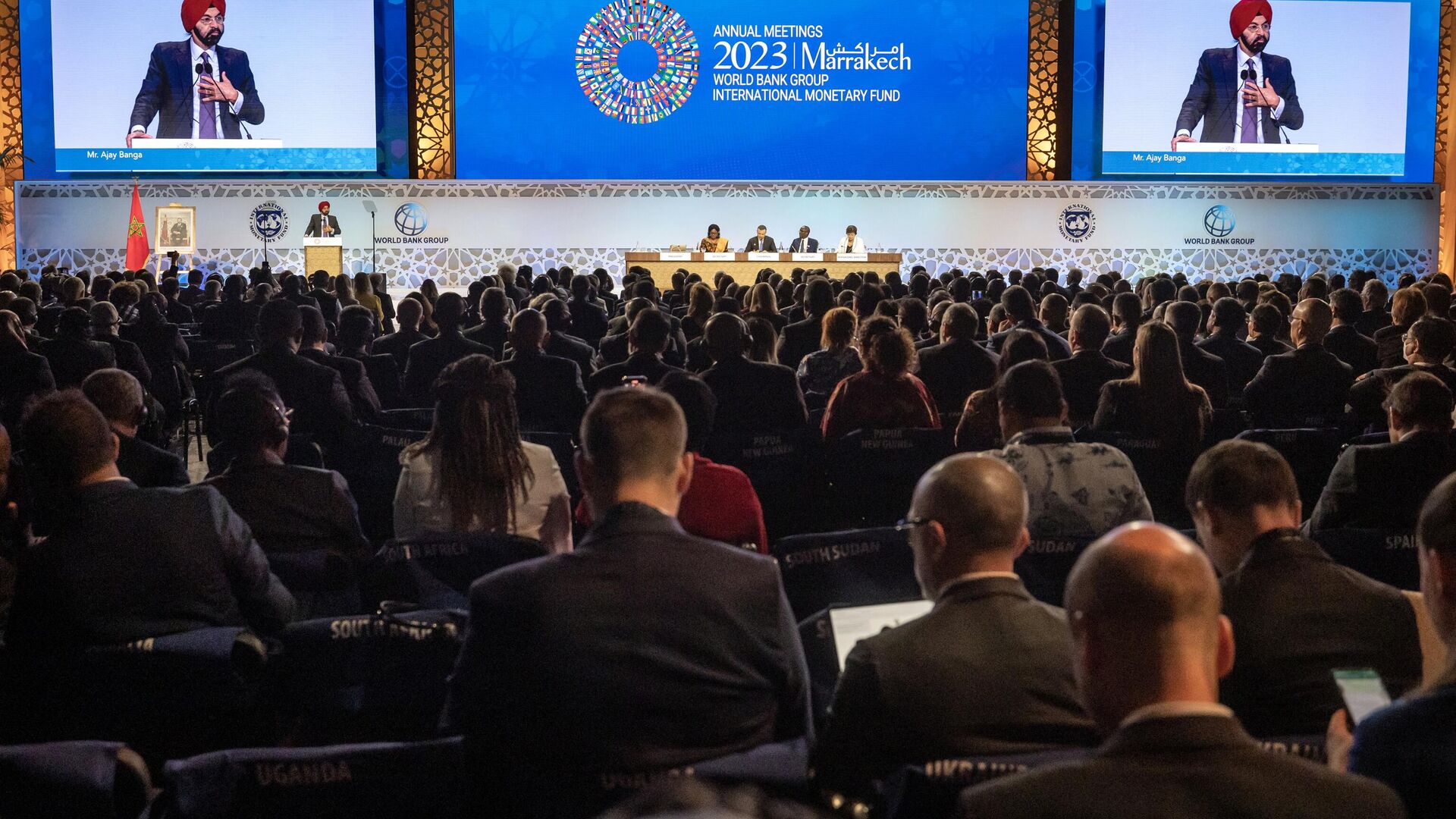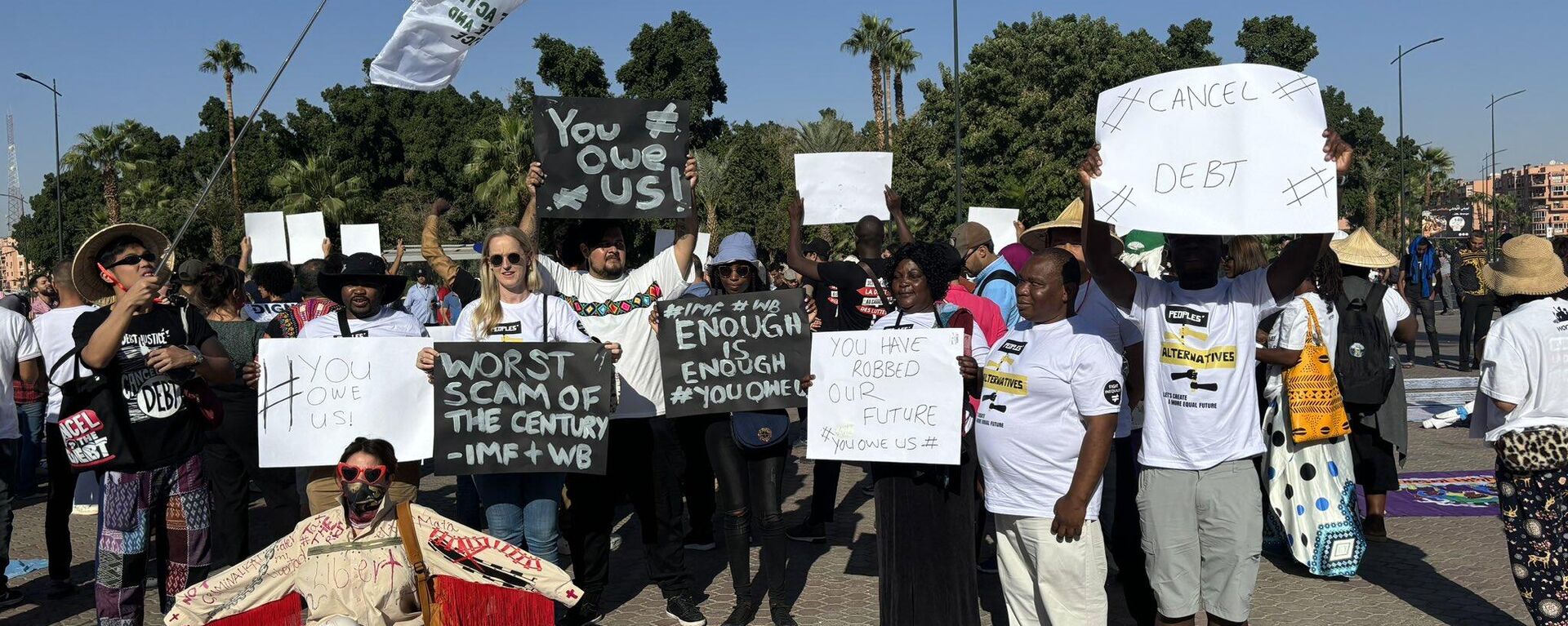https://en.sputniknews.africa/20231015/funding-crunch-caused-by-rich-states-hits-africa-can-be-worsened-by-middle-east-conflict-reports-1062806888.html
First World's Funding Crunch Stings Africa, Can Be Worsened by Mideast Conflict: Reports
First World's Funding Crunch Stings Africa, Can Be Worsened by Mideast Conflict: Reports
Sputnik Africa
For the first time since 1973, on October 9-15, 2023, Africa is hosting the meeting of the International Monetary Fund (IMF) and the World Bank. One of the... 15.10.2023, Sputnik Africa
2023-10-15T11:44+0200
2023-10-15T11:44+0200
2023-10-15T17:04+0200
ukraine
international monetary fund (imf)
world bank
economy
inflation
crisis
china
egypt
zambia
sputnik africa
https://cdn1.img.sputniknews.africa/img/07e7/0a/0f/1062809093_0:161:3070:1888_1920x0_80_0_0_6776c23d93d3987495a38b8df52ab93f.jpg
Africa suffers from a funding squeeze brought on by the mistakes of wealthy countries, which could worsen due to the Israeli-Hamas war, media reported, citing Egyptian Finance Minister Mohamed Maait.The minister noted that the United States and Europe's extravagant spending spree during the pandemic triggered higher interest rates and rising inflation, which affect African nations, the outlet said.According to the media, Egypt is negotiating with the IMF to expand the country's rescue program from $3 billion to $5 billion.In addition, Maait reportedly revealed that due to overly expensive Western capital markets the state "went East" in search for more affordable loans and plans to issue bonds denominated in Chinese national currency and sold in China, so-called Panda bonds.Moreover, Zambia reportedly validated an agreement to a memorandum of understanding with creditors, co-led by China and France, regarding restructuring its $6.3-billion debt.The first agreement of the southern African state with bilateral creditors on the matter was achieved in June under the G20's Common Framework for debt treatment.Although the deal is "on paper a really good outcome" for Zambia, the country's head of Development Reimagined and senior associate at the Africa Program of the Center for Strategic International Studies (CSIS), Hannah Ryder in an interview with Sputnik Africa underlined that it could become a "significant problem" for the government in the future.The expert explained that since the deal is brokered by the IMF, the state may be forced to reduce fuel and food subsidies for citizens to meet the financial institution's prescriptions, this could lead to an economic recession and spark protests.According to the IMF's estimates, over a half of Africa's low-income nations are reportedly subject to debt distress. The average yields on euro bonds in other states has increased to more than 12%, yet before the pandemic the figure was 7%, the outlet reported.Due to the higher rates, Kenya is also among the countries that is forced to refinance and considers borrowing from multilateral and bilateral lenders in order to repay a $2-billion eurobond in June, the media noted.Speaking about the current "discriminatory" financing criteria, Burkinabe Minister of Energy, Mines and Quarries Simon-Pierre Boussim revealed in exclusive interview with Sputnik Africa that he opposed the current process of acquiring funds which is based on discount rates, adding that the international financing systems need to be redefined.Commenting on the funding crunch that the continent is facing, Ghanaian Finance Minister Ken Ofori-Atta reportedly said that in order to solve the problem, the support of major shareholders is required, however, due to a lack of political will, it hasn't happened yet.
https://en.sputniknews.africa/20231013/biggest-scam-of-the-century-global-south-activists-slam-world-bank--imf-1062752781.html
ukraine
china
egypt
zambia
burkina faso
kenya
ghana
Sputnik Africa
feedback@sputniknews.com
+74956456601
MIA „Rossiya Segodnya“
2023
Rasina Musallimova
https://cdn1.img.sputniknews.africa/img/07e7/0a/17/1063019139_0:0:646:646_100x100_80_0_0_348c74b69cf86748a53875f8148a2f85.jpg
Rasina Musallimova
https://cdn1.img.sputniknews.africa/img/07e7/0a/17/1063019139_0:0:646:646_100x100_80_0_0_348c74b69cf86748a53875f8148a2f85.jpg
News
en_EN
Sputnik Africa
feedback@sputniknews.com
+74956456601
MIA „Rossiya Segodnya“
Sputnik Africa
feedback@sputniknews.com
+74956456601
MIA „Rossiya Segodnya“
Rasina Musallimova
https://cdn1.img.sputniknews.africa/img/07e7/0a/17/1063019139_0:0:646:646_100x100_80_0_0_348c74b69cf86748a53875f8148a2f85.jpg
ukraine, international monetary fund (imf), world bank, economy, inflation, crisis, china, egypt, zambia, sputnik africa, burkina faso, kenya, ghana
ukraine, international monetary fund (imf), world bank, economy, inflation, crisis, china, egypt, zambia, sputnik africa, burkina faso, kenya, ghana
First World's Funding Crunch Stings Africa, Can Be Worsened by Mideast Conflict: Reports
11:44 15.10.2023 (Updated: 17:04 15.10.2023) For the first time since 1973, on October 9-15, 2023, Africa is hosting the meeting of the International Monetary Fund (IMF) and the World Bank. One of the main topic of this year gathering is the impact of Israeli-Palestinian escalation on the world economy in the wake of the Ukraine conflict, elevated inflation and high interest rates.
Africa suffers from a funding squeeze brought on by the mistakes of wealthy countries, which could worsen due to the Israeli-Hamas war, media reported, citing Egyptian Finance Minister Mohamed Maait.
The minister noted that the United States and Europe's extravagant spending spree during the pandemic triggered higher interest rates and rising inflation, which affect African nations, the outlet said.
"We have to pay the cost. With the war, the pain becomes very hard for us," he was quoted by the media as saying on the sidelines of the annual IMF-World Bank meetings.
According to the media, Egypt is negotiating with the
IMF to expand the country's rescue program from $3 billion to $5 billion.
In addition, Maait reportedly revealed that due to overly expensive Western capital markets the state "went East" in search for more affordable loans and plans to issue bonds denominated in Chinese national currency and sold in China, so-called Panda bonds.
"The issue of high debt, high debt financing, low liquidity — all these represent the challenges we’re facing. The rating agencies have no mercy to our situation," the minister added.
Moreover, Zambia reportedly validated an agreement to
a memorandum of understanding with creditors, co-led by China and France, regarding restructuring its $6.3-billion debt.
The first agreement of the southern African state with bilateral creditors on the matter
was achieved in June under the G20's Common Framework for debt treatment.
Although the deal is
"on paper a really good outcome" for Zambia, the country's head of Development Reimagined and senior associate at the Africa Program of the Center for Strategic International Studies (CSIS), Hannah Ryder in an interview with
Sputnik Africa underlined that it could become a "
significant problem" for the government in the future.
The expert explained that since the deal is brokered by the IMF, the state may be forced to reduce fuel and food subsidies for citizens to meet the financial institution's prescriptions, this could lead to an economic recession and spark protests.
According to
the IMF's estimates, over a half of Africa's low-income nations are reportedly subject to debt distress. The average yields on euro bonds in other states has increased to more than 12%, yet before the pandemic the figure was 7%, the outlet reported.
Due to the higher rates, Kenya is also among the countries that is forced to refinance and considers borrowing from multilateral and bilateral lenders in order to repay a $2-billion eurobond in June, the media noted.
"We’re not facing a solvency problem, we’re facing a liquidity challenge. But how we solve those liquidity challenges can become a solvency problem," the state's Treasury Secretary Njuguna Ndung’u was cited by the outlet as saying.
Speaking about the current
"discriminatory" financing criteria, Burkinabe Minister of Energy, Mines and Quarries Simon-Pierre Boussim
revealed in exclusive interview with
Sputnik Africa that he opposed the current process of acquiring funds which is based on discount rates, adding that the international financing systems need to be redefined.
Commenting on the funding crunch that the continent is facing, Ghanaian Finance Minister Ken Ofori-Atta reportedly said that in order to solve the problem, the support of major shareholders is required, however, due to a lack of political will, it hasn't happened yet.
"You wonder where is the leadership of the past? The FDRs [Franklin Delano Roosevelt], the Mandelas. It is a question of where our common humanity is," the minister highlighted.



